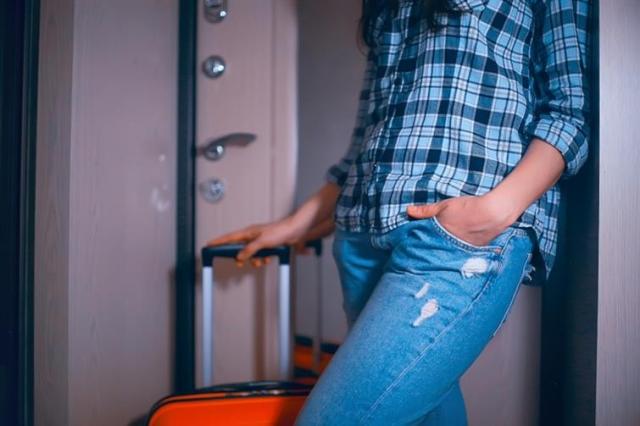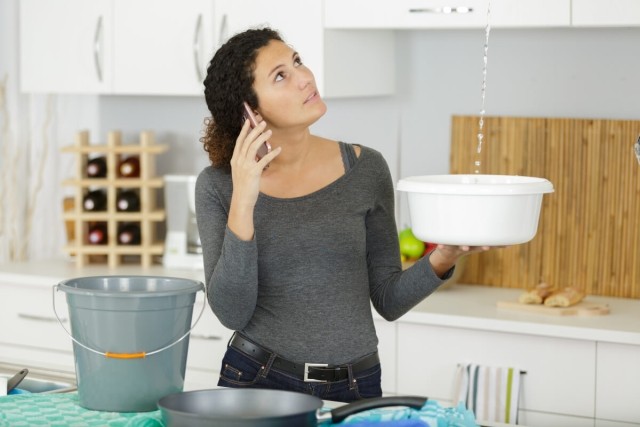Whether you’re going on a vacation, traveling for work, visiting family, or something in between, how to protect your home while on vacation or traveling may have crossed your mind. By following a few simple steps, you can enjoy your trip worry-free.
1. Get Renters Insurance
Some general apartment security advice is to always have renters insurance (even if you think you’ll never use it). It’s especially important to purchase if you’re planning on traveling, but not all insurance policies are made equal so you may need to check if your current or potential plan needs to be reconsidered.
You should make sure that your plan offers the four main types of coverage: personal property damage, personal liability, additional living expenses, and medical payments. The personal property coverage should include “covered peril damages” such as fire, theft, flood, windstorm/hail, vandalism, mold, smoke, etc. Other types of coverage cover things like someone getting injured in your apartment or making accommodations if your apartment becomes uninhabitable.
Some landlords require you to purchase renters insurance in order to rent with them, but that’s not always the case. Hopefully you’ll never have to utilize it, but renters insurance is incredibly important and necessary to have. Even though your landlord should have insurance, their insurance only covers damages done to their building, but renters insurance will cover damages to your possessions so it’s definitely worth the money.
2. Prepare Your Apartment
To be sure you can jump back into your day-to-day life when you come home, you’ll want to make sure your space is organized and clean. This will protect and prepare your home for a long absence. Take out the trash, wash dishes, vacuum floors, do laundry (make sure the lint filter is clean), and check fridges and pantries for any food that will spoil while you’re away. For energy saving purposes, unplug appliances that don’t need to run and adjust the thermostat to energy preferred settings. Confirm that whoever is responsible for your pets, plants, or mail is still prepared to help. If you’re going to be gone for an extended period, consider putting a hold on your mail or you can even do a temporary change of address.
Double check that windows and doors are locked and secured. Another good investment is smart bulbs and locks, so you can turn on lights to make it look like you’re home. If you have any hidden keys, make sure that you take them up and note who has a spare key. It would be best to invest in smart locks to eliminate any hidden or spare keys floating around, and you can directly control who enters your house at what time. Of course, any valuables or important documents should be placed in fire safe lock boxes.
No one wants to be surprised with a missed bill or late fee when they come home, so if you can swing it, prepay bills before you leave or sign up for autopayments. This way you don’t have to worry about paying bills while you’re trying to relax. Double check with your landlord and your lease to see what arrangements might need to be made in advance.
3. Don’t Announce Your Vacation Plans
Vacations are exciting and you want to keep everyone updated, so it might seem totally harmless to post about and announce travel plans on social media, but try to avoid posting anything that lets people know you’re going away or are gone. I know those family beach pics are cute but wait to post them until you get home. If you can’t help yourself, make sure that your posts and stories are only visible to people you know and trust.
While it’s not a good idea to let everyone know you’re going to be away for a while, it’s a good idea to let a few trusted people know you’re going to be gone. If you know and trust anyone that lives around you, inform them that you’re going to be gone so that they can keep an eye out for you. If you’re not comfortable with asking your neighbors, ask a trusted friend or family member that lives nearby to check in on your place. They can gather your mail (if you don’t put it on hold), shovel the snow around the door if it’s snowing, take up a trash can, etc. Ask them to do things so that your rental looks as it would from the outside if you were there. Be reasonable with what you ask them to do but work together. You can always return the favor for them while they’re out of town.
A common question among renters is if your landlord needs to be notified that you’re leaving. The short answer is yes, but check your lease. Some landlords have terms in their leases that may require you to let them know if you’re going to be absent for an extended period and may even require you to pay rent early if you’ll be gone more than a month. As a renter, it will more than likely benefit you to notify your landlord about any trips. This way there is an extra set of eyes looking out for any issues.
4. Monitor From a Distance
If you travel frequently or are going on a long trip, purchasing app-controlled cameras will help put your mind at ease. There’s a lot of different systems and cameras that you can purchase that offer different levels of home security.
Devices like video doorbells — you can even purchase special holders for them so you don’t mark your rental — are a great option if investing in the full-scale video camera home security system isn’t right for you. You can also purchase cameras that connect with your smart home devices so you can be in total control of your home while away.
5. Secure Your Car
Now that your home is prepared for your trip, don’t forget about your car. If you’re not taking it with you, make sure the windows are rolled all the way up and check to make sure the doors and trunk are locked. If you have a garage, make sure that your car is inside with the unit closed and locked.
If your apartment doesn’t have a garage option, remove all your belongings from your vehicle and place them in your apartment. In the case of no covered parking, it’s a good idea to try and avoid parking under trees in case of inclement weather. You can also put a car cover over it to further protect your car from the elements. Another idea if you don’t have a garage on your property, is to rent a space in a parking garage that is protected by security cameras.
You may also want to let your landlord know that you’re going to be leaving your vehicle and give them the license plate number and description of your car. This way, security can double check to make sure that they don’t see anything unusual.
6. Consider a House-Sitter
If you’re going to be gone for an extended time or are renting a single-family house, a house-sitter might be a good option to prepare your home for a long absence. You can ask someone you know and trust or use a reputable house sitter finder site to hire someone to stay in your house while you’re away. This way, you don’t have to worry about pets, plants, mail, etc. Just make sure you notify your landlord that you’re going to be away and double check with them and your lease that you can have a house-sitter.
No matter your reason for travel or the length of your trip, you don’t want to be thinking about your rental while you’re gone, and you shouldn’t have to. Following these suggestions will help put your mind at ease and protect your home while you’re traveling. Happy travels!






